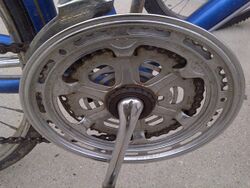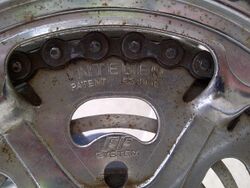Engineering:Front freewheel
A front freewheel or freewheel crank is a freewheel mechanism used on some bicycles which enables the drivetrain of the bicycle to continue spinning while the rider rolls, but stops pedaling (also called "coasting"). Unlike regular bicycles, a front freewheel can make it possible to shift gears using a derailleur while the rider is coasting if paired with a fixed rear hub or a freehub with a slight resistance in the freewheel mechanism, which causes the chain to continue to spinning with the wheel rotation.[1]
Freewheels in the bottom bracket has been used on some pedelec electric bicycles, and is a necessary part for all mid-drive systems to allow the electric motor to work inside its optimal rotational speed range (r/min). With a mid-mounted motor the motor mounted near by the crankset, as opposed to front-mounted motors which sit in the front hub, and rear-mounted motors which sit in the rear hub.
History
The Shimano Front Freewheel (FFS) was a proprietary bicycle drivetrain design of the 1970s that placed a freewheel between the pedal cranks and the front chainrings — enabling the rider to shift gears while coasting.[2] FFS rear freewheel is different than a standard freewheel because it's "stiff" with more friction than a normal rear freewheel. It will slip if necessary however, to stop the chain in the event of, for example, a clothing tangle — which could otherwise lead to injuries of the leg by the drivetrain, crashing of the bicycle, or both.
FFS marketing followed Shimano's then-current path of beginning with lower-cost implementations of the system using low tech and usually heavier materials. The resulting system was substantially heavier than the standard freewheel and, in any event, did not penetrate the market noticeably, although Panasonic, Ross, Schwinn, and Raleigh briefly equipped bicycles with FFS. The late Sheldon Brown called FFS a "solution in search of a problem."[3]
Non-proprietary front freewheels can currently be found on bikes used for bike trials riding, such as the Honda RN-01 G-cross. Such a system allows for the use of cheaper fixed-gear rear hubs instead of cassette hubs, lower gear ratios, and increased ground clearance at the bottom bracket.[4]
References
- ↑ Intend adds a freewheel to their cranks, letting you shift without pedaling - Bikerumor
- ↑ "Shimano 1982 Catalog: FF System". http://sheldonbrown.com/shimano1982/pages/35.html. Retrieved 2012-10-16.
- ↑ "Sheldon Brown, Shimano". http://www.sheldonbrown.com/shimano.html.
- ↑ "Trials Tech". http://www.biketrials.com/tech/index.shtml. Retrieved 2015-10-08.
 |



